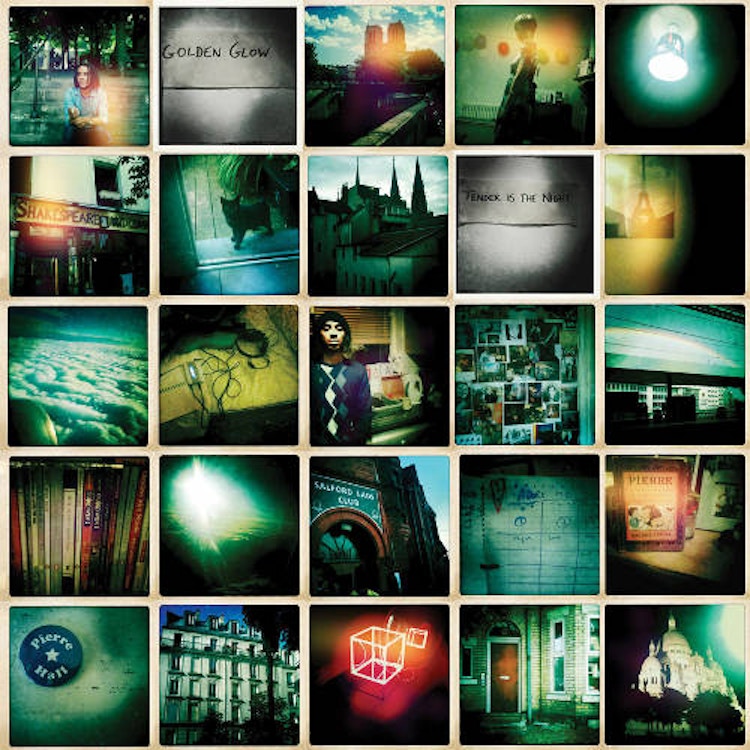"Tender Is the Night"

Pierre Hall’s debut album as Golden Glow, Tender Is the Night, is being released on the same day as Bon Iver’s Bon Iver. This is probably a co-incidence, but nevertheless it is a tidy one. The Bon Iver founding story is perhaps the one association with Justin Vernon that refuses to shift; while the man himself changes guises (bearded folkie, post-rock frontman, R&B collective contributor, hip-hop side-kick, Phil Collins impersonator) as often as he changes underpants, in the cultural imagination he seems destined to remain “that bloke what went into the woods and wrote an album about being lonely.”
It was perhaps not a game changer in the music industry; interesting back-stories had been used before to promote interest in albums and to create a connection between the “real world” and the ephermeral world of aristry. But it does seem that now, as Okkervil River’s Will Sheff sang earlier this year, “we need a myth” – how is the listener supposed to believe in the sincerity of the record if they don’t know you really lived through that pain?
So: Pierre Hall, formerly of Manchester band Lead Balloons, was involved in a serious car accident, and lost the use of his legs for six months. Out of the tragedy, immobile and isolated, Hall begun sketching the early ideas for these songs, and recorded them to a four-track, which ended up being the version of the songs that was released, such was the “intimacy and rawness”, according to the press release, of the tapes. There is a very deliberate effort in the aforementioned press release to intertwine the tragedy of Hall’s accident with the songs, with statements such as “the songs…were as much a function of the situation they were being recorded in as they were of Pierre’s writing and performance”. It’s a line that could so easily have been trotted out about Bon Iver’s debut.
The problem is that For Emma became inextricably linked with its creation myth because the songs themselves help up the story. From the lonely palm-muted strum with which Vernon counts himself in at the start of ‘Flume’ to the echoey creak as he gets up to turn off the recorder at the finale of ‘Re: Stacks’, the tracks drip with a hollow, confessional loneliness – the sparsity of the production on that record makes it sound like we were listening to something we should never have been allowed to hear. Tender Is the Night, while lyrically focussing almost myopically on abandonment and isolation, never reaches a level of warmth or honesty that makes me really believe it came from a place of such depth of feeling, never makes me believe that Hall’s personal tragedy is really relevant to my understanding and appreciation of these songs. The sparsity of the production here only serves to make the record feel like we should never have heard it because it was never really finished, rather than coming off as intimate and raw, they sound like little more than promising demos.
It’s curious that while the songs undoubtedly do come out of the isolation in which they were written, the album functions better when allowed to simply exist on musical terms alone, when attempts toward biographical validation are forgotten. Hall is firmly rooted in the Mancunian tradition, and harks back to the city’s glorious past. The album’s lead track ‘Adore Me’, which repeats the line “you don’t adore me”, can’t help but be heard as a reposte to the Stone Roses’ ‘I Want to Be Adored’, while, despite the warmth of the lo-fi production, Hall’s vocals readily recall the cold detatchment of Ian Curtis, particularly through the industrial fuzz of album highlight ‘The Blizzard.’ The other influences are clear, and this is a singularly British record – one of the tracks is even named ‘The Cure’, and from the more immediate past, Hall’s lethargic vocals recall the laid-back croon of Alex Turner’s quieter moments.
Ultimately that coldness and lethargy proves the record’s downfall. It is detached and unengaging, and the best moments come when Hall is flagrantly aping one of his influences rather than providing anything original, and in those moments, I’d still rather listen to post-punk from the first time around. It’s also all too easy to criticise the ill-advice that led Hall to releasing what is essentially a demo tape, when there could have been something more rewarding to gain from some meaure of polish.
Get the Best Fit take on the week in music direct to your inbox every Friday

Wet Leg
moisturizer

MF Tomlinson
Die To Wake Up From A Dream

BIG SPECIAL
National Average





